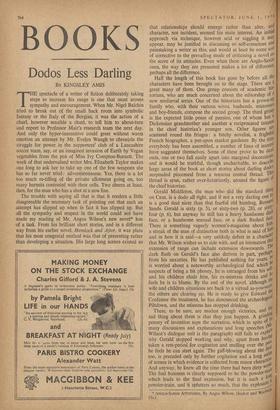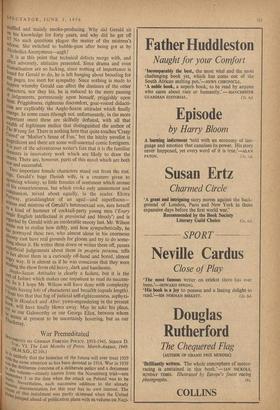BOOKS
Dodos Less Darling
BY KINGSLEY AMIS THE spectacle of a writer of fiction deliberately taking steps to increase his range is one that must arouse sympathy and encouragement. When Mr. Nigel Balchin tried to break out of the small back room into symbolic fantasy or the Italy of the Borgias, it was the action of a churl, however sensible a churl, to tell him to about-turn and report to Professor Mair's research team the next day. And only the hyper-insensitive could greet without warm emotion an attempt by Mr. Evelyn Waugh to chronicle the struggle for power in the supporters' club of a Lancashire soccer team, say, or an imagined invasion of Earth by Vegan vegetables from the pen of Miss Ivy Compton-Burnett. The work of that undervalued writer Mrs. Elizabeth Taylor makes one long to ask her to take up one of the few weapons she has so far never tried : adventurousness. Yes, there is a lot too much re-tilling of the private allotment going on, too many hermits contented with their cells. Two cheers at least, then, for the man who has a shot at a new line.
The trouble with saying all that is that it renders a little disagreeable the necessary task of pointing out that such an attempt has slipped up when in fact it has slipped up. But all the sympathy and respect in the world could not have made my reading of Mr. Angus Wilson's new novel* less of a task. From his brilliant short stories, and in a different way from his earlier novel, Hemlock and After, it was plain that his most congenial method was that of presenting rather than developing a situation. His large long scenes existed so that relationships should emerge rather than alter, and character, not incident, seemed his main interest. An initial approach via technique, however arid or niggling it nlaY appear, may be justified in discussing so self-conscious and painstaking a writer as this, and would at least be some sort of corrective to the prevailing mode of criticising a novel cal the score of its attitudes. Even when these are Anglo-Saxoa ones, the way they are presented makes a lot of difference, perhaps all the difference. Half the length of this book has gone by before all the characters have been brought on to the stage. There are a great many of them. One group consists of academic his' torians, who are much concerned about the editorship of 3 new mediaeval series. One of the historians has a grown-of) family who, with their various wives, husbands, mistresses and boy-friends, compose the second group. The third group' is the expected little posse of pansies, one of whom has 11 Dickensian grandmother and another a reciprocated interest in the chief historian's younger son. Other figures arc scattered round the fringes : a bitchy novelist, a frightful French biographer, a put-upon market gardener. By the time everybody has been assembled, a number of lines of interest have suggested themselves. Some of these prove to be dead ends, one or two fall easily apart into marginal decorations, and it would be truthful, though uncharitable, to describe large areas of the book as short stories about darling dodos suspended piecemeal from a tenuous central thread. IV thread is spun, rather over-luxuriantly, around the figure 01 the chief historian. Gerald Middleton, the man who .did the standard thuic on Cnut, is a dodo all right, and if not a very darling one he is a good deal nicer than that fearful old humbug, Bernard Sands. Gerald is sixty (p. 5), or sixty-two (p. 28), or sitar four (p. 6), but anyway he still has a heavy handsome dark face, or a handsome sensual face, or a dark flushed face' There is something vaguely women's-magazine about h a streak of the man of distinction both in what is said of Intl' and in how it is said—a very unlikely defect in a character that Mr. Wilson wishes us to side with, and an intimation dial extension of range can include extension downwards. The dark flush on Gerald's face also derives in part, perhaP9' from his anxieties. He has published nothing for years, is worried about a noteworthy archmological find which 11° suspects of being a bit phoney, he is estranged from his wl and his children elude him, his ex-mistress drinks and 1/c feels he is to blame. By the end of the novel, although wife and children situations are back to a virtual as-you-wcre the others are clearing up. He is ready to give Edward di; Confessor the treatment, he has denounced the archr:eologtedj Piltdown, and the mistress has stopped drinking. These, to be sure, are modest enough victories, an.A Oil' sad thing about them is that they just happen. A grind penury of invention saps the narrative, which in spite of ii5 many discussions and explanations and long speeches ( Wilson's dialogue unit is the paragraph) still fails to exf"' why Gerald stopped working and why, apart from haVI1 taken a rest-period for cogitation and mulling over the Iws he feels he can start again. The gaff-blowing about the
and.
too, is preceded only by further cogitation and a long series of scenes in which evidence is collected from minor charae And anyway, he knew all the time there had been dirty Of'. The find business is clearly supposed to be the powder-teal,r' which leads to the final explosion. but it is such a powder-train, and it splutters so much, that the explosion j5 * ANGLO-SAXON Arrimolis. By Angus Wilson. (Seeker and Wart 15s.) Muffled and mainly smoke-producing. Why did Gerald sit l)n his knowledge for forty years, and why did he get off it? No such questions plague the matter of the mistress's reform. She switched to bubble-gum after being got at by Alcoholics Anonymous—aagh! it is at this point that technical defects merge with, and affect adversely, attitudes presented. Since drama and even tlraanatisation are so lacking, since nothing of importance is loand for Gerald to do, he is left hanging about brooding for 100 pages, too inert for sympathy. Since nothing is made to happen whereby Gerald can affect the destinies of the other characters, nor they his, he is reduced to the mere passing of judgements, portentously upon himself, priggishly upon them. Priggishness, righteous discomfort, goat-voiced didacti- cism are explicably the Anglo-Saxon attitudes which finally elllerge. In some cases (though not, unfortunately, in the more important ones) these are skilfully deflated, with all that wealth of legitimate malice that distinguished the author of l'h e Wrong Set. There is nothing here that quite touches 'Crazy owd' or 'Mother's Sense of Fun,' but the bitchy novelist is Magnificent and there are some well-assorted comic foreigners. It is part of the adventurous writer's fate that it is the familiar elements in innovatory work which are likely to draw the cheers. There are, however, parts of this novel which are both new and successful.
wo important female characters stand out from the rest. 'age. Gerald's huge Danish wife, is a creature given to 4gnaisitig whimsy, to little frenzies of sentiment which arouse all „ ells censoriousness, but which evoke only amusement and potinPassion. mixed about equally, in the reader. Elvira aeIwity. granddaughter of an aged—and superfluous— tress and mistress of Gerald's heterosexual son, sees herself as a kind of hammer of cocktail-party young men (`Every gie English intellectual is provincial and bloody') and is ed by Gerald with an intolerable snooty lust. Mr. Wilson regard scents Ins not to realise how deftly, and how sympathetically, he has Portrayed these two, who almost alone in his enormous gl °only cast have real grounds for gloom and try to do some- sh g about it. He writes them down or writes them off, passes iiin Oerficial judgements about them in propria persona, tells as lies "es about them in a curiously off-hand and bored, almost 4 "rY Way. It is almost as if he was conscious that they were aimg the show from old heavy, dark and handsome. `.11glo-S'axon Attitudes is clearly a failure, but it is the of failure which makes one impatient to read its success- 44. , („ ' it I hope Mr. Wilson will have done with complexity uals having lots of characters) and breadth (equals length). h tuDe too that that fug of judicial self-righteousness, asphyxi- holg in hemlock and After, yawn-engendering in the present ht will have finally blown away. May he take his place, he as our Gulsworthy or our George Eliot, between whom Th seems at present to be uncertainly hovering, but as our ackeray.



































 Previous page
Previous page